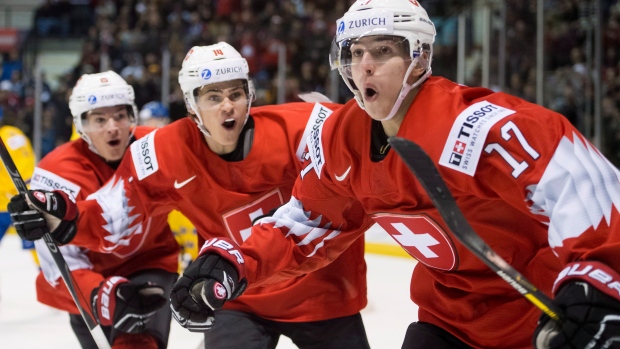Jan 3, 2019
Underdogs, historic hockey rivals to battle in WJC semis
A pair of upsets has created a battle of the underdogs in the semifinal round of this year's world junior hockey championship.
The Canadian Press

VANCOUVER — A pair of upsets has created a battle of the underdogs in the semifinal round of this year's world junior hockey championship.
Switzerland and Finland are still in medal contention after posting surprising wins over last year's champion and runner-up.
The U.S. and Russia also advanced, though their victories were less shocking.
Here's a look at what to expect in the semifinals:
SWITZERLAND (2-0-1-2) VS. FINLAND (2-1-0-2)
Both teams punched their tickets to the playoffs with stunning victories over junior hockey powerhouses on Wednesday.
Switzerland blanked Sweden 2-0 and Finland squeaked out a 2-1 overtime win against Canada.
But neither team thinks it will be easy to get to the gold medal game.
"What I've seen so far, we'll have a tough opponent against us," Finnish coach Jussi Ahokas said Thursday.
The Finns have a lot of skill, including a trio of NHL players and 17-year-old Kaapo Kakko, who's expected to go high in this year's draft.
Controlling the puck and getting those guys to the front of the net will be key to beating the Swiss, Ahokas said.
"We have to know when we have to act fast and when we have to control it. But the biggest thing is that we have to get the net-front guys more involved, get some tips in," he said. "And of course we have to drive to the net even harder."
Finland hasn't taken a medal from the tournament since winning it all in 2016.
The drought has been even longer for the Swiss — the nation's only world juniors medal was a bronze in 1998.
"I told the guys that's a lifetime chance for us and for everybody," said coach Christian Wohlwend. "And we will never forget about it. We can write history for Swiss hockey and world hockey."
The Swiss penalty kill has been the second-best in the tournament this far, allowing just two goals on 19 chances.
They've also got a lot of help from goaltender Luca Hollenstein, who's stopped 87 of the 89 shots he's face over three games, good for a .978 save percentage.
Preparing for a semifinal match is no different than any other game, Wohlwend said.
"Everybody knows now what we have to do," he said. "Everybody knows even more and believes that it works, what we do."
RUSSIA (5-0-0-0) VS. U.S. (4-0-1-0)
Old rivalries run deep with these two teams.
U.S. coach Mike Hastings said Thursday that he's "pretty old" so he knows a lot about what's happened between the two squads.
"There's a lot of history that goes in my mind," he said, pointing out the "Miracle on Ice" at the 1980 Olympics in Lake Placid.
Both teams are coming into the semifinals confident after posting convincing wins in the quarterfinals.
The U.S. beat the Czechs 3-1 while Russia trounced Slovakia 8-3.
Hastings said last year's bronze medalists will have to play "a full 60 minutes" to chalk up a similar victory against Russia.
"The one thing they can do is they can stress you in many different ways," he said. "You look at their ability to score short-handed on the power play. They just have a tendency to be a puck position team. They're not going to get rid of it until you make them get rid of it."
Hastings wants to see his players stay disciplined and out of the penalty box.
Russia has the best power play in the tournament so far, putting up five goals on 16 chances, and is the only team to still have a perfect record, winning all five matches so far in regulation.
Meanwhile, the Americans boast the best penalty kill, allowing a single goal on 11 chances and their roster includes the tournament's leading scorer. Montreal Canadiens prospect Ryan Poehling has five goals and three assists so far.
The U.S. has already beaten Russia in pre-tournament play, but Russian defenceman Dmitri Samorukov isn't concerned.
"Doesn't matter, different team, different day, right?" he said. "We'll just play our best game."
